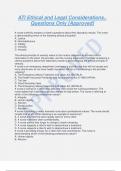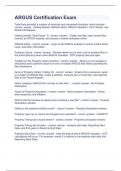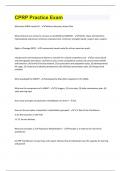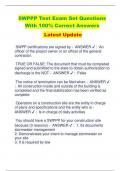Lecture notes IPol
lecture 1 - 7 September - the journey into politics
what are we studying?
Politics is a contested concept → seen as a lot of thing but mainly:
1. the art of government → politics as an arena
2. public affairs → politics as an arena
3. compromise and consensus → politics as a process
4. distribution of power and resources → ecnomics → politics as a process
Positionality is very important in politics:
your position in society shapes what you see - and what you find
important.
The people who dominate, rule → they decide which problems are
important.
I.E. in US political science: more than 65% men, more than 90% white.
Political science is ‘The Science of Politics’ and ‘Political Science’
Ideology
Ideology is a coherent set of ideas that ultimately lead to a preferred
outcome of how a state is shaped.
Liberalism
Key ideas: individualism, consent, constitutionalism. → political powers
have to guard individual freedoms.
Classic liberalism differs with modern liberalism → classical liberalism is
based on negative freedoms, modern liberalism is based on positive
freedoms.
Lecture notes IPol 1
, Conservatism
Doesn’t want reforms → no experiments (CDU-germany) (experts
instead of experiments)
Key ideas: tradition, pragmatism, human imperfection, organicism,
hierarchy, authority, property.
lately, The New Right came up → reaction against apperent failure of
Keynesian social democracy and concern about ‘social breakdown’.
Socialism
Karl Marx → “The philosophers have only interpreted the world in
various ways. The point, however, is to change it.” → society is divided
in classes.
three socialist currents:
Communism: normative ideal → remains vague
Socialism: political system
Marxism; theory of history → history about how society forms, with
class struggles between the rich and the poor and that would
eventually lead to a revolution.
Society as a system of exploitation and oppression. → Politics as
the organized enforcer of this system.
Culture and ideas as the legitimator of this system → ‘awakened’
tensions will get stronger and it will lead to change.
Feminism
Feminism is a school of thought that puts central the unequal and unfair
(power-)relations between men and women.
three waves of feminism:
1. 1st wave: formal political rights
2. 2nd wave: gender relations in society (”the personal is political”)
3. 3rd wave: diversity within gendered relations; attention to diversity in
gender identities.
Post-colonialism
Tradition of political thought focused on:
Lecture notes IPol 2
, Political, societal, economic, cultural and psychological
Environmentalism
Sees society and contemporary politics through the lens of ecological
impact and sustainability
wide range of flavours, from esoteric (spiritual) to rational-scientific
→ May become a serious (and radical) force to reckon with.
(the ministry for the future - Kim Stanley Robinson)
Populism and beyond
Appeals to voters’ gut feelings. (subconcious plays)
Frequently driven by rejection of minorities and their rights
Strong focus on a leader (rules are thrown overboard to keep the
leader in power).
Sceptical of democratic intitutions, suspecting elites to have rigged
them.
Populist chant: “Power to the People”
Lecture 2 - 14 september -
What is the state?
Five key features of the state
Sovereignty: ultimate power internally → ultimate source of authority
Public character: in charge of collective (and collective binding)
decisions
Exercise in legitimation: the state has to justify their decisisions so that
they are made in public interests
Instrument in domination
Territorial association: the jurisdiction is territorially defined.
Lecture notes IPol 3
lecture 1 - 7 September - the journey into politics
what are we studying?
Politics is a contested concept → seen as a lot of thing but mainly:
1. the art of government → politics as an arena
2. public affairs → politics as an arena
3. compromise and consensus → politics as a process
4. distribution of power and resources → ecnomics → politics as a process
Positionality is very important in politics:
your position in society shapes what you see - and what you find
important.
The people who dominate, rule → they decide which problems are
important.
I.E. in US political science: more than 65% men, more than 90% white.
Political science is ‘The Science of Politics’ and ‘Political Science’
Ideology
Ideology is a coherent set of ideas that ultimately lead to a preferred
outcome of how a state is shaped.
Liberalism
Key ideas: individualism, consent, constitutionalism. → political powers
have to guard individual freedoms.
Classic liberalism differs with modern liberalism → classical liberalism is
based on negative freedoms, modern liberalism is based on positive
freedoms.
Lecture notes IPol 1
, Conservatism
Doesn’t want reforms → no experiments (CDU-germany) (experts
instead of experiments)
Key ideas: tradition, pragmatism, human imperfection, organicism,
hierarchy, authority, property.
lately, The New Right came up → reaction against apperent failure of
Keynesian social democracy and concern about ‘social breakdown’.
Socialism
Karl Marx → “The philosophers have only interpreted the world in
various ways. The point, however, is to change it.” → society is divided
in classes.
three socialist currents:
Communism: normative ideal → remains vague
Socialism: political system
Marxism; theory of history → history about how society forms, with
class struggles between the rich and the poor and that would
eventually lead to a revolution.
Society as a system of exploitation and oppression. → Politics as
the organized enforcer of this system.
Culture and ideas as the legitimator of this system → ‘awakened’
tensions will get stronger and it will lead to change.
Feminism
Feminism is a school of thought that puts central the unequal and unfair
(power-)relations between men and women.
three waves of feminism:
1. 1st wave: formal political rights
2. 2nd wave: gender relations in society (”the personal is political”)
3. 3rd wave: diversity within gendered relations; attention to diversity in
gender identities.
Post-colonialism
Tradition of political thought focused on:
Lecture notes IPol 2
, Political, societal, economic, cultural and psychological
Environmentalism
Sees society and contemporary politics through the lens of ecological
impact and sustainability
wide range of flavours, from esoteric (spiritual) to rational-scientific
→ May become a serious (and radical) force to reckon with.
(the ministry for the future - Kim Stanley Robinson)
Populism and beyond
Appeals to voters’ gut feelings. (subconcious plays)
Frequently driven by rejection of minorities and their rights
Strong focus on a leader (rules are thrown overboard to keep the
leader in power).
Sceptical of democratic intitutions, suspecting elites to have rigged
them.
Populist chant: “Power to the People”
Lecture 2 - 14 september -
What is the state?
Five key features of the state
Sovereignty: ultimate power internally → ultimate source of authority
Public character: in charge of collective (and collective binding)
decisions
Exercise in legitimation: the state has to justify their decisisions so that
they are made in public interests
Instrument in domination
Territorial association: the jurisdiction is territorially defined.
Lecture notes IPol 3







